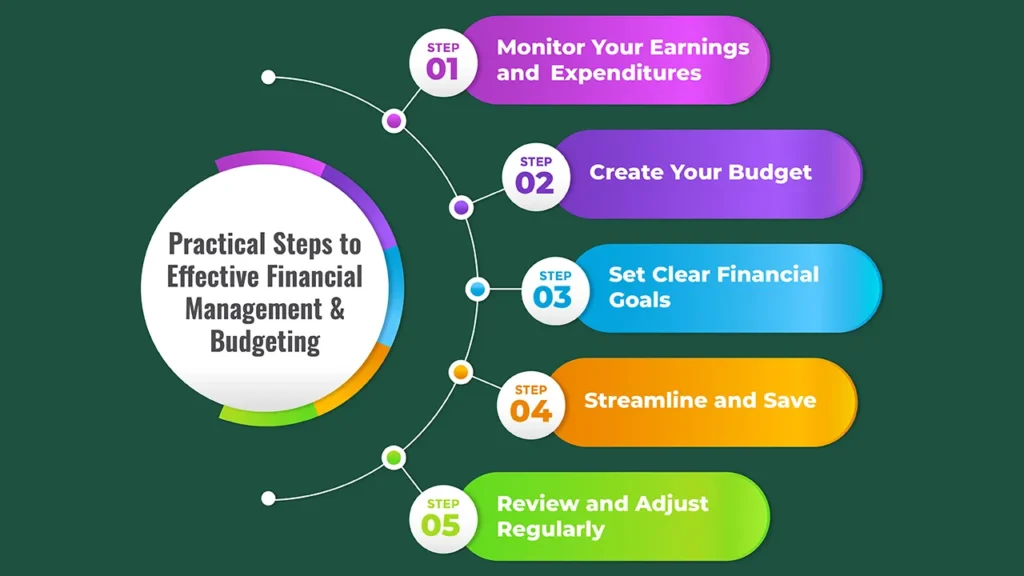Have you ever questioned where your money goes? Imagine living a life free from financial anxieties and concerns. For many, it’s a challenge managing all of the data and business issues that bring on stress and fear. But good money management as a solution can prevent you from losing control of your finances.
These are not just concepts; The Importance of Financial Management and Budgeting that every person can use to attain his or her goals in life. In this post, we are going to discuss the need for financial management and budgeting and how it can change your financial future.
What is Financial Management and Budgeting? (Defining the Concepts)
1. Financial Management
Financial management is the planning, organizing, directing and controlling of one’s financial resources. Money is a main topic, which includes, amongst other things, income, spending, saving, investing, liability, and risk management.
Good money management unburdens you and keeps you making wise decisions with your cash, which naturally translates to better financial well-being. For a deeper dive into personal financial management, resources from the Consumer Financial Protection Bureau (CFPB) can be invaluable.
2. Budgeting
A budget is a line-item representation of the expenses you will incur while in school (and perhaps beyond school life for many of us). Budgeting simply means deciding how you will allocate incoming funds to different categories.
Then tracking your spending to ensure you stay within your limits. Budgeting is a tool that you use in the world of financial management to help you reach your financial goals.
Why It Matters to Everyone: The main Importance
1. Gaining Control and Clarity
Good financial management gets rid of the guesswork. It gives you a visual of your actual cash flow, which in turn allows you to see your financial “reality.” This clarity helps keep you informed regarding your spending and savings.
2. Achieving Financial Goals
A well-crafted budget connects your spending and saving to specific goals, like a void shaped to fit a key — whether that’s a down payment on a house, retirement, education, or travel.
You can then fund what matters to you by prioritizing your resources. A budget, for one, allows you to save for a car or pay off debt more efficiently.
3. Alleviating financial anxiety and stress
By managing finances, you can ease a lot of the stress that comes along with bills and unexpected expenses. A good budget is freeing and enhances well-being because it solves the mystery of “where does all my money go?”
4. Building an Emergency Fund
Emergency funds are a critical safety net for job loss, medical emergencies, and car repairs. It means you’re not able to take on new debt in times of crisis, which smacks of proactive financial management.
5. Paying Off Debt Effectively
Having a budget is also key to finding money to accelerate debt repayment. It allows you to choose a strategy, either based on debt snowball or snow avalanche, which in the long run can save you a lot of interest.
6. Encouraging Savings and Investment
It helps to identify additional funds that can be put to work and leads to regular contributions to savings and investments. And this is the key to generating wealth and achieving financial independence.
7. Improving Credit Score
Paying on time is one of the ways good budgeting affects your creditworthiness. The better the credit score, the easier it will be to access lower interest rates for a loan in the future.
8. Taking control of your financial life
Good financial management means that when you make a big purchase, or switch careers, or Investment and Wealth Growth strategies, you can do so with data, rather than on a hunch or gut feeling.
The Importance of Financial Management and Budgeting Methods:

1. Monitor Your Earnings and Expenditures
The first step to personal finance is to know your money and where it’s going. Approaches like spreadsheets, budgeting apps (such as Mint or YNAB), or just pen and paper are all fair game. Classifying your spending will allow you to know where your money is headed.
2. Create Your Budget
Select a budgeting technique that best suits you, whether it be the 50/30/20 method, Zero-Based Budgeting, or the Envelope System. Apply money to needs, wants and savings/and debt, and be sure the budget is realistic and versatile.
3. Set Clear Financial Goals
Set some financial goals for the short, medium, and long term. Ensure they are SMART (Specific, Measurable, Achievable, Relevant, Time-bound), and connect your budgeting to these for specificity.
4. Streamline and Save: Automating your savings and debts
Adopt the “Pay Yourself First” system, which enforces discipline in your savings and debt-paying actions.
5. Review and Adjust Regularly
Check in on your budget once a month or once a quarter. Your budget should flex as life does. Enjoy your achievements, but don’t be afraid to grow out of them.
What Everyone Gets Wrong About Budgeting?
1. “Budgeting Limits/Deprives You of What You Want”
Budgeting already is a practice of intentional decision-making, not a life of deprivation. It offers you the freedom to do the most important things.
2. “I Don’t Understand Budgeting / I Don’t Have Time for This”
Budgeting can be simple, and the payoff is huge. Budgeting can be easy and painless with the right tools.
3. “I Don’t Make Enough to Budget”
It is particularly important if you don’t have much money. It retains the interest you can earn on every rupee and ensures that you have the wherewithal to meet your financial needs.
4. “I don’t need a budget cause I don’t have any debt!”
Everyone needs to budget, no matter where you are with income or debt. It makes it easier to plan for the future and reach financial goals.
Tools and Resources That Can Help
- Budgeting Apps: You can use budgeting apps such as Mint, YNAB, EveryDollar, or PocketGuard to help make maintaining your budget easier.
- Spreadsheet Templates: Free spreadsheet templates are available online and can be a very useful tool in managing your financials.
- Financial Calculators: Take advantage of savings, debt repayment, and retirement calculators for better decision-making.
- Credit Counseling Agencies: When you’re struggling with debt, you can get help from credit counseling agencies for even the most extreme cases.
- Financial Advisors: You can get further assistance with all phases of financial planning from a financial advisor.
- Books, Blogs, or Podcasts: Look for credible sources to further your personal finance and budgeting education.
Conclusion
In conclusion, the value of financial planning and budgeting cannot be overemphasized. Not only do these tactics offer control, but they also allow him to reach his financial goals and lower his stress level.
Engage in these tools, and you enable yourself to have a safe, abundant life in the future. If you are not, begin taking steps, even if small baby steps, and enjoy the road to financial freedom. There’s peace of mind in mastering your money.
FAQs
Why is financial management important?
Money management is important to feel confident about making financial decisions, reaching your financial goals, and ultimately becoming financially secure.
What is budgeting?
A budget is a well-detailed schedule indicating how and when you will spend and save money over time so that you can allocate money efficiently.
How can I start budgeting?
You can start by monitoring your income and spending, making a budget that reflects your financial objectives, and keeping it under review and adjusting it.
What are some of the common budgeting approaches?
Some well-known budgeting methods include the 50/30/20 rule, Zero-Based Budgeting, and the Envelope System.
How does budgeting help to lower financial stress?
1. Making a budget helps you understand and manage your money.
2. Reduces stress related to invoices and unforeseen expenses.


